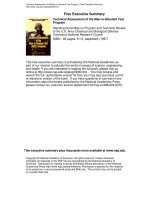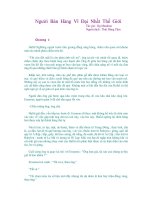The man in the window
Bạn đang xem bản rút gọn của tài liệu. Xem và tải ngay bản đầy đủ của tài liệu tại đây (1.18 MB, 217 trang )
The characters and events portrayed in this book are fictitious. Any similarity
to real persons, living or dead, is coincidental and not intended by the author.
Text copyright © 1992 Jon Cohen
Introduction and Readers’ Guide copyright © 2013 Nancy Pearl
All rights reserved.
No part of this book may be reproduced, or stored in a retrieval system, or
transmitted in any form or by any means, electronic, mechanical,
photocopying, recording, or otherwise, without express written permission of
the publisher.
Published by AmazonEncore
P.O. Box 400818
Las Vegas, NV 89140
ISBN-13: 9781477848937
ISBN-10: 1477848932
CONTENTS
Introduction
Dedication
PART ONE THE MONSTER OF WAVERLY
CHAPTER ONE
CHAPTER TWO
CHAPTER THREE
CHAPTER FOUR
CHAPTER FIVE
PART TWO THE MAN IN THE WINDOW
CHAPTER ONE
CHAPTER TWO
CHAPTER THREE
CHAPTER FOUR
CHAPTER FIVE
CHAPTER SIX
CHAPTER SEVEN
PART THREE WIDOWS AND WIDOWERS
CHAPTER ONE
CHAPTER TWO
PART FOUR THROUGH THE LOOKING GLASS
CHAPTER ONE
CHAPTER TWO
CHAPTER THREE
CHAPTER FOUR
PART FIVE FLAMES
CHAPTER ONE
CHAPTER TWO
CHAPTER THREE
CHAPTER FOUR
CHAPTER FIVE
Afterword
Acknowledgements
Reader’s Guide for The Man in the Window
Discussion Questions
Suggestions for Further Reading
About the Author
About Nancy Pearl
About Book Lust Rediscoveries
Introduction
PROBABLY THE question that I’m most often asked by people is, “How do you
choose what you’re going to read?” and I don’t really have a good answer for
them. I can relate to the novelist Carrie Brown (my favorite book of hers is
Lamb in Love) who described herself as being “a promiscuous reader.” I’ll
give almost any book a chance to have its way with me. I read all sorts of
nonfiction (pretty much everything, in fact, but generally not self-help books,
unless they’re by Harriet Lerner—my favorite of hers is The Dance of
Anger). History and current events have always been two of my particular
nonfiction favorites. And of course I read a lot of fiction, both literary and
genre (which is not to say that I think a sharp line can be drawn between the
two).
I usually start off the process of identifying my next book by cruising the
shelves in a bookstore or library, looking for jacket art that seduces my eye or
a title that tugs at my mind. I know from long experience that if the author’s
name on the cover is in a bigger font size than the title, then I can be pretty
sure the book is aimed directly at the best-seller list and therefore probably
isn’t one that I want to take to bed (where I do a lot of my reading) with me.
Then I open the book to a random page in order to get a sense of whether
it’s worth my while trying to develop a relationship with it or whether I’m
better off putting it back on the shelf where I found it, knowing that it’s not
right for me. (Kind of like a first date.) For example, if I discover that I’m
going to be inside the head of a vicious serial killer—or sociopaths in general
—even if it’s only in the first chapter or in alternate chapters, then it’s a nogo. I remember once asking a little boy—he must have been about 7 or 8—
what kind of books he liked. “No dead dogs,” he told me. I knew exactly
what he meant. For me, it’s no murdered, or tortured, or sexually abused
children.
I study the blurbs on the back of the book, not so much to see what they
say about the book (they’re all, obviously, going to wax eloquent about how
wonderful it is; otherwise they wouldn’t be there) but rather who’s saying it.
If the blurbists are writers or reviewers whom I respect, I’m more inclined to
read the book. I also check to see if the quotes are taken from reviews in
newspapers or magazines, or if they were solicited from the author’s friends
or the editor’s contacts in the literary world. There was a column called
“Logrolling in Our Time” in the (very) late, (very) lamented Spy magazine
that revealed authors each of whom wrote a glowing blurb for the other’s
book. If the blurbists all live within hailing distance of each other, I don’t
take it as a good sign. Believe me, read enough and you get to know these
things, like where the authors live. Writers are asked to blurb books all the
time—I receive at least one request a week. (Margaret Atwood has a
wonderful poem called “Letter sent in reply to requests for blurbs” that
speaks to this; it’s easy to find on the Internet.)
I found Jon Cohen’s The Man in the Window when I was working as the
head of collection development at the Tulsa (OK) City-County Library
System in the spring of 1992, right after it had been published. It was
displayed face out on the “New Books” shelf. I didn’t love the cover, which
was in various shades of green and brown and centered on a Picasso-esque
painting of a man’s head and upper body apparently looking out through (or
maybe embedded in, it was hard to tell) a window. There was nothing
especially wrong with it (I am a great fan of cubism), but there wasn’t
anything that I found especially appealing, either. I turned the book over and
looked at the blurbs on the back of the jacket. One, from an author I wasn’t
familiar with, was for the book I was holding. The other four, taken from
newspaper reviews, referred to Cohen’s first novel, Max Lakeman and the
Beautiful Stranger, which I hadn’t read.
No obvious turn-offs, so far, but neither was I hearing that little voice (the
one that I never tire of; that delights me, still) telling me that this might be a
book I didn’t want to miss. So what made me open The Man in the Window
to the first page and start reading? It was, perhaps illogically, actually the size
and shape of the book itself. Not its thickness, nor the number of its pages,
but rather its length and breadth. It was a hardcover, but was the size and
shape of a trade paperback, which were not as ubiquitous in the early 1990s
as they are now. It looked like it would be utterly comfortable to hold. It
looked like a book that could easily be lost amongst the bigger and brawnier
novels on the shelf, the runt of the litter, so to speak, and I just couldn’t resist
giving it a chance to win me over.
And when I read the entrancing first line of The Man in the Window, I
knew I’d made no mistake. Here was a novel to love. And so it proved to be.
That first line—“Atlas Malone saw the angel again, this time down by the
horse chestnut tree.”—made it impossible for me to put the book down. I
loved the interplay of the fantastic—an angel!—with the utterly prosaic—a
horse chestnut tree. And the specificity: not just any old chestnut tree, but a
horse chestnut. (I have to say here that, not being a gardener or arborist, I
never knew there were such things as horse chestnut trees before I read The
Man in the Window. You read and learn.) And that simple word “again.”
How could I bear not to find out when Atlas encountered an angel before?
Clearly, this was a book that was written with a reader like me in mind.
For many years, whenever I was asked to give a talk about good books to
read, I would include The Man in the Window, and I’d describe it to the
audience this way:
When he was sixteen, Louis Malone was caught in a fire that erupted
at his father’s hardware store. He was burned so badly that for the next
sixteen years he didn’t go out of his family’s house, spending his days
watching the outside world through his second story bedroom window.
And even in the house he covered up the terrible scars on his face by
wearing a scarf around his mouth and chin and a baseball cap with a
Pittsburgh Pirates logo pulled down low over his forehead. But one day
Louis reenters that world, falling from, or somehow being impelled
through, the window that he’s been hiding behind for so many years.
Rushed to the hospital by neighbors who are wild with curiosity to find
out what he looks like underneath his hat and scarf (which he manages
to keep on despite the fall and a broken arm), he meets Iris Shula, an
Intensive Care nurse who’s covering the emergency room when he
arrives. Iris describes herself as being four foot seven and weighing one
hundred fifty-five “very poorly distributed pounds,” with “a nose like a
boxer’s, and the complexion of a corpse.”
Then I’d read from the book: “Iris had been an unappealing baby—and
babyhood, as it turned out, was her physical high point. She went from
unappealing to unattractive, and by the time she moved into adolescence,
she’d become undeniably homely. Even her parents, who loved her, who
gave her every benefit of the doubt and then some, could not dispute the
evidence.”
And I’d conclude by saying that Iris, in her own way, had been just as
alone in the outside world as Louis had been in his upstairs room. And that
the relationship that slowly develops between Louis and Iris both breaks and
remakes the reader’s heart and offers some good laughs along the way.
Usually when I’m perusing book jacket copy, I take words like lifeaffirming, heartwarming, touching, uplifting, poignant, and tender as a
warning: DO NOT READ, LIKELY TO BE SENTIMENTAL CLAPTRAP.
But in the hands of that all too rare writer who respects his readers and
doesn’t try to manipulate them through cheap emotions and easy tears, a book
can be deeply satisfying because it is so authentically life-affirming and
heart-warming, etc. Cohen is such a writer, and The Man in the Window is
such a novel.
Nancy Pearl
TO MOLLY AND BEN
PART ONE
THE MONSTER OF WAVERLY
CHAPTER ONE
ATLAS MALONE saw the angel again, this time down by the horse chestnut
tree. Yesterday the angel had stood, in a floaty sort of way, beside the
raspberry patch—Atlas couldn’t tell if its feet touched the ground with any
kind of earthly weight. Indeed, when he inspected the spot later, not a blade
of grass had been disturbed, although an entire cane of raspberries had been
picked. Gracie, his wife, said she had not gone near his patch.
Today beneath the horse chestnut tree the angel appeared to have more
substance, a physicality it had not possessed before—gained, perhaps, from
stolen raspberries. Atlas turned to see if Gracie was nearby, but she was still
in the front yard mulching the tulip bed. He opened his mouth to call to her,
but then shut it again. For all he knew, the angel had the nerves of a cat and
might be scared off by the least little thing.
The angel, whose face Atlas could not discern, stood beside the tree. A
bright wedge of summer sunlight touched its wings, and the angel lifted them
slightly, flexing, taking in the warmth. Atlas began to walk the length of the
backyard toward the horse chestnut tree. He kept his hand extended before
him, ready to greet the angel as he might a guest at his weekly Rotary Club
luncheon.
The thoughts that came to him were ordinary and peaceful, and for a
moment he forgot about the angel waiting for him down at the bottom of his
yard. The grass needs cutting, he thought, maybe I’ll do it before I take my
nap this afternoon. The hedge has filled in well. I should water the zinnias.
He paused, then turned and took it all in, his house and yard, the sense of
Gracie, busy in the tulip bed, close to him. He brought his hand to his chest
and touched it lightly there, mistaking a tingling in his heart for pleasure.
When Atlas turned again, his hand out and ready, he had reached the angel.
The angel’s head was bent; he was looking down. At his shoes, thought
Atlas. I know those shoes, and as Atlas brought his eyes slowly up again, he
recognized the pants too, and the shirt. They were his clothes, old and
familiar, the most comfortable he owned. Now the angel lifted his face, and
revealed himself with a slight smile. Atlas saw that the face also was old and
familiar, that it was his own. The angel took Atlas’s outstretched hand, and
they stood together for a long moment beneath the cool shade of the tree.
Atlas looked into the angel’s eyes, eyes he had always known, and said,
“This isn’t so bad, is it?”
No, said the angel, not moving his lips or making a sound, it’s not so bad.
Beneath the angel’s feet the grass remained undisturbed, as before, but it bent
and flattened as Atlas dropped first to his knees, then face forward down into
the green.
Coming around the side of the house with a wheelbarrow full of weeds,
Gracie watched it happen. She saw Atlas place one hand over his heart and
the other straight out in front of him as if he was reaching for something.
“Atlas,” she called, and began to hurry, then run to him, her white hair
flying. “Atlas!”
When he fell to the grass, she knew, even before she reached him, that he
was dead.
“Damn you, Atlas,” she whispered fiercely, as she drew him to her. She
held him, her white hair dropping forward, mingling with his. Somewhere
above her came a fluttering of wings and a rising.
CHAPTER TWO
THE UNDERTAKER, Jim Rose, son of Big Bill Rose, founder and owner of
Rose’s Funeral Home, the only funeral home in Waverly, Pennsylvania,
didn’t appear to understand what Gracie was saying.
“Mrs. Malone,” he said, in a voice modulated by eight hundred and fifty
dollars’ worth of concern and accommodation—eight hundred and fifty
dollars being the price of the cheapest of the cheap coffins, the one Gracie
wanted, and a funeral with a minimum of fixings. “Mrs. Malone, if you don’t
feel you have a suit appropriate for Mr. Malone, Rose’s can arrange—”
“My husband, I guarantee you, Mr. Rose, does not wish to travel through
eternity in a necktie and a pair of shiny shoes pressing on his bunions.”
Louis Malone, Gracie’s thirty-two-year-old son, sat at the top of the stairs
listening to his mother and Jim Rose.
Gracie held out a flannel work shirt, a pair of corduroys thin at the knees,
gray cotton socks, and an old pair of Hush Puppies. Atlas’s favorite clothes.
Jim Rose still declined to take them. “Mrs. Malone, really. I just don’t feel
this is, well… I don’t feel we’d be doing our job. It’s just not professionally
acceptable.”
Louis coughed. He knew his mother had been given her opening.
“Professionally acceptable,” mused Gracie, her hand smoothing back and
forth over the flannel shirt. “You have standards, after all.”
“Yes ma’am,” said Jim Rose. “Of course.” He tried a smile.
“Big Bill’s standards. Of course.”
The smile began to disappear back into Jim Rose’s face. “My father’s
standards, yes.”
“Now tell me, Mr. Rose, are those the standards he had prior to the
unfortunate incident of the ice, or the new standards that followed the
unfortunate incident of the ice?”
Louis shifted on the stair and laughed softly. The unfortunate incident of
the ice had been one of Atlas’s favorite stories. In fact, everybody in Waverly
had enjoyed it for over forty years. Everybody, that is, except the perpetrator
and those related to him.
During World War II, Big Bill Rose came up with an idea, or scheme as
Atlas would call it whenever he told his version of the story, that was
patriotic, enterprising, and good for an easy buck. When he got caught, Big
Bill emphasized the patriotic part, and his accusers emphasized the buck part.
Big Bill’s was one of the last funeral homes in that part of Pennsylvania
that still used ice instead of mechanical refrigeration to maintain the loved
one until interment—or, as Atlas put it in his version, to keep the corpses
cold and the stink down before planting them, getting his words out quick
before Gracie could reach across the dinner table to slap his arm. Wasting so
much good, usable ice after each burial had always pained Big Bill. When
World War II came along and conservation and thrift became every good
citizen’s duty, a light bulb clicked on in the dim attic of Big Bill’s brain.
Without offering too many details as to the origins of the ice, Big Bill
approached his sister, Edith, who ran a little catering business out of her own
kitchen, with a plan that, as he would later explain to his accusers, “was first
and foremost, and originally intended, to ease the burdens of our fighting
boys overseas.” This was not what he had told Edith. He referred to his
“surplus of ice” and a small deal that would be mutually beneficial to them
both—whenever Edith was in need of ice for one of her grander events, such
as the Waverly Firemen’s Ball or the Kiwanis’s annual chicken barbecue, Big
Bill would supply her at half price. His yearly revenue, for the one year he
derived income before his scheme collapsed, came to six dollars and twentythree cents—an amount, Atlas would say in his version of the story, that even
in those days was still a pissy handful of change (Gracie would not even
bother to slap at him at this point, he’d used so much dirty talk).
Big Bill’s twice-used ice operation might have flourished had Lucy
Jameson not ordered a Pepsi-Cola with “lots of ice” at her wedding reception
at Waverly Lodge, catered by Edith Rose, in the hot summer of 1943. To his
credit, and as he repeatedly explained to his accusers, Big Bill always rinsed
his ice, “carefully,” he said. Of course “carefully” meant one thing to his
accusers and something else again to Big Bill, who rinsed, carefully, making
real sure he didn’t melt his profits down the drain—a drain that in this case
was located in the center of Big Bill’s aging porcelain embalming table.
Lucy, impelled by the heat of the day and the anticipated heat of her
impending honeymoon encounter, had drained her Pepsi-Cola (chilled with
carefully rinsed ice) in one great swallow. When she finished, she continued
to hold her tilted glass to her lips. An array of looks flashed across her face,
all partially concealed by her upended glass. Surprise. Confusion. And then,
slowly, a sort of giddiness. For there, in the bottom of the glass that Lucy still
pressed up into her face, came a glint of frozen gold from among the silver
chips of ice. A ring, a man’s wedding band. Lucy was pleased. She looked
shyly at her new husband, Albert Jameson, who stood at her side. She had no
idea Al was capable of play, that he was such a trickster, and this odd little
game came as something of a relief to her. But when she looked down at Al’s
left hand and saw his wedding band firmly in place on his finger, her giddy
feeling returned to one of confusion.
Al, who was not playful, stared disapprovingly at his new wife as she
poured the glass of ice into the palm of her hand, and frowned deeper still
when she handed him, embedded in a large chip, the wedding ring. Looking
very glum, as if he thought the ring was a mysterious suitor’s challenge to his
claim on Lucy, Al cracked the ice chip on the end of the refreshment table.
The noise captured the attention of all the wedding guests who were not
already staring at the strange behavior of the bride and groom.
Al held the ring up and turned it in the sun. “Well, sweet Jesus,” he said.
The wedding guests pressed closer. Al read out loud the inscription on the
inside of the ring. “Norman Keeston. May 10, 1886.”
May 10, 1886, was the date of Norman Keeston’s wedding day. The date
of Norman’s demise was just three days ago, and his preservation on ice and
subsequent burial yesterday morning was courtesy of Rose’s Funeral Home,
Bill Rose, director. Lucy fainted right then and there and was immediately
attended to by her bridesmaids and all the other women present except for
Edith Rose, who remained standing behind the refreshment table beside her
ice chest. All the men gathered around Al with one exception, Big Bill Rose,
who slipped quietly away to his Studebaker, and sped off for the safety of his
funeral home.
It didn’t take long for the men to deduce the chain of events that placed
Norman Keeston’s wedding ring in the bottom of Lucy Jameson’s glass of
Pepsi-Cola. First, they ruled out that Norman’s ring came out of the Pepsi,
because it was too large to pass through the opening of the glass bottle. Then
Al remembered that it had been half-frozen in a piece of ice, and all the men
turned their eyes toward Edith Rose. Her brother’s name emerged unbidden
from her lips. “Bill,” she said. “I got that ice from my brother Bill.”
It took less than five seconds for the wedding guests to understand the
implications of ice from brother Bill. A great gasp went up from the crowd,
particularly and especially from those whose drinks were cooled with Big
Bill ice. At this point in his telling of the story, Atlas would make awful
spitting and throat-clearing noises, imitating the guests, then grin at Gracie
and Louis.
Weakness of the flesh had been the culprit. Poor Norman Keeston’s finger,
already contracted with age, contracted further still as he reposed upon a bed
of ice on the embalming table. When Big Bill and his assistant had
transferred Norman to the dressing table the morning of the funeral,
Norman’s ring slid off and disappeared among a thousand frosty chips, all
bound for the Jameson wedding.
But for a timely catastrophe, that would have ended the career of Big Bill
as Waverly’s sole funeral director. Sergeant Marple of the Waverly police
brought the news, pushing his way through the crowd of men who’d driven to
Rose’s Funeral Home, until he reached Frank Pearly, his chief. Chief Pearly
was trying to keep Al Jameson from strangling Big Bill. Sergeant Marple’s
news made the men go slack. The Mader twins and Stu Kipner had drowned
in Waverly Lake after their boat capsized. No one spoke until Big Bill cleared
his throat and uttered the words that saved his career.
“Neighbors. I’m sorry for the unfortunate incident of the ice. Please bring
those boys to me and I will attend to their funeral needs at no cost to their
families.” His voice caught a little on the “no cost” part, but he managed to
get the words out. The wedding crowd nodded their silent approval and then
made their way to their cars.
Al Jameson was the last to go. He hesitated in the doorway, turned, looked
Big Bill in the eye, then tossed him Norman’s wedding ring. His curse
echoed in the funeral parlor as if from the walls of an Egyptian tomb. “May
you choke on this ring, you greedy bastard.”
For seventy-five cents, his profit from the Keeston/Jameson ice deal, a
profit he didn’t even have in his pocket because his sister Edith had yet to pay
him, and probably never would, Big Bill got stuck for three free funerals, was
shamed before his community, and cursed by an enraged groom. All in all,
not a very good day for the funeral industry in Waverly.
Even though he couldn’t see them, Louis knew from the silence downstairs
that his mother and Jim Rose were reliving the unfortunate incident of the
ice. Gracie’s eyes had softened, then closed for a long moment as she
remembered Atlas telling the story year after year at the dinner table. His
details were the details she remembered, even though she had actually been at
the Jameson wedding and he had been away at basic training at Fort Jackson.
He’d gleaned his story from the stories of others until he formed a version
that was his own. “You should have seen Lucy Jameson’s face,” he’d say,
and Gracie would say, “I was there, Atlas, I did see it.” “But no,” Atlas
would say, “you should have seen it.” And somehow it got to be, from the
sheer force of joy he derived from the telling of it, that she saw Lucy or Al or
Big Bill or Sergeant Marple the way he saw them, as characters in a
wonderful fiction that was true. These people, whom she encountered every
day on the streets of Waverly, were elevated by Atlas’s recounting of their
lives, taking on proportions they did not necessarily possess.
Of course it was unkind of Gracie to use the unfortunate incident of the ice
on Jim Rose, Louis knew. Jim Rose probably looked very grim. Perhaps now
he would strike back at Gracie through some little unkindness of his own. Do
something, say, to Atlas, humiliate the corpse by burying him with no pants
on or with his finger up his nose. But Gracie had not said it, Louis was sure,
simply to put Jim Rose in his place. Gracie was a brand-new widow, and the
power of her grief, of her missing of Atlas, may have moved her to this
exchange with Jim Rose, so that the mentioning of Big Bill and the ice could
become inevitable, so that then she could recall a specific moment that was
Atlas, could recall him telling his story, and recall further the twenty or thirty
times in twenty or thirty ways that Atlas had told the story, and in the
specificity of all those moments Gracie would have him again. He would not
have left her as he did beneath the horse chestnut tree.
CHAPTER THREE
UPSTAIRS, WATCHING the flow of bustling women from behind a curtain, Louis
thought of trick-or-treaters. Yes, their faces bore that same look of dread and
excitement, as on the faces of children in costume, that comes when dead
things are in the air.
Gracie let them in, the women who came in twos or threes, never alone,
and endured again and again the awful awkward moment as they all stood
there in the front hallway. She wished they’d leave their casseroles and cakes
on the front doorstep like the UPS man—ring the bell, drop their goods, and
disappear. This time it was Kitty Wilson and Bev Howard. Kitty lived next
door to Gracie, in the house with the new aqua aluminum siding that Atlas
said was capable of causing permanent eye damage in a man of his advancing
years. Bev lived four houses down and had a yard full of topiary hedges, poor
abused plants shaped to resemble elephants and bears. Atlas teased Bev and
her husband, Bert, to no end about those hedges. Atlas never missed an
opportunity to be simple and infuriating. He’d stand beside a bear hedge,
knowing it was a bear hedge, and say, “My God, Bert. That’s more like an
elephant than an elephant is like an elephant. Gracie and I were watching the
Nature show on PBS last night, no, the night before, ‘Sunrise on the
Serengeti,’ and the elephants on that show were nowhere near as majestic or,
I’m telling you, Bert, as realistic as this one.” More than once over the years,
Atlas would be walking by and spot Bev on her knees in the ivy, or Bert
patching the walk, and he’d stop and stare at them with hard accusing eyes.
When he got their attention and then held them with that look until they’d
begun to fidget, he’d nod over at one of the bear hedges and say in a low
even voice, “One of your bears got into my trash cans last night. See that it
doesn’t happen again.” Then, without a flicker of a smile, he’d say, “Good
day,” and march off down the block.
Louis loved the elephants and bears, and once he slipped out at night to be
with them. While Waverly slept, Louis moved among the animals, then stood
very still and watched them move around him. It was in winter after a new
snow. He thought it was wonderful to watch the bears and elephants playing
in the snow.
Bev scrunched up her face into what was supposed to be, Gracie figured, a
mask of neighborly commiseration. But it didn’t quite come together
somehow, and poor Bev with her drooping mouth looked as if she had
suffered a mild stroke. Kitty’s face was more composed, held in place by
generous layers of makeup. She always coordinated her colors, the lips and
eyes matching the stones on a necklace or picking up a hint of something in a
sweater. This time her eyes were rimmed with an intense aqua. Could it be,
Gracie wondered, that Kitty is coordinating herself with the new aluminum
siding on her house?
Kitty, herself five years a widow, blinked her aqua eyes several times—a
display meant to demonstrate the effort it took to contain her tears. Kitty
blinked and Bev snuffled, her drooping mouth going up and down. Gracie
looked at her two neighbors twitching and grunting before her and thought,
Grief is an ungainly dance.
Kitty held her casserole out to Gracie. Unable to say, I am so sorry, Gracie,
we’ll all miss Atlas, which is what in her own way she felt, Kitty said, “Oh
Gracie, here. I whipped this up for you—sweet potatoes with a marshmallow
glaze. Put that in the oven at three-fifty for twenty minutes, then take the lid
off for ten minutes at the end to let it brown.” She placed the dish in Gracie’s
hands as solemnly as if she were handing over an urn containing Atlas’s
ashes. Then she stepped back, relieved, and it was Bev’s turn.
Bev looked scared, as though she thought widowhood might be catching.
Bert, after all, was two years older than Atlas. Maybe there had been some
sort of mix-up, maybe it was Bert who was supposed to have collapsed in his
backyard. When she heard about Atlas, Bev had whisked Bert out of the yard
where he’d been trimming the elephants and made him lie down on the sofa.
“Gracie,” Bev began, then stopped. She gulped.
Gracie said, “It’s all right, Bev.”
“No, Gracie,” she said. “It’s just that… Here. I made these. The little sugar
cookies Atlas liked so much. Remember, at our barbecue two years ago? He
ate a full dozen, at least, and Bert, he was so busy at the grill and everything,
he didn’t even get one, but I guess Atlas didn’t notice about Bert, or he just
liked them so much he couldn’t help himself. Anyway he sure ate them.” She
thrust the tin of cookies at Gracie.
Gracie remembered things a little differently. The reason Atlas ate the
sugar cookies as though they were the main course was because, in the end,
that’s what they turned out to be. Bert always had a few beers before the
annual picnic with Gracie and Atlas, because Atlas made him nervous. He
could never quite tell when Atlas was joking and when he wasn’t—like with
the hedges. Bert must have been extra nervous, because he’d had more than a
few beers that day. During two and a half interminable hours, he managed to
drop three steaks and most of the chicken breasts on the ground, and the food
he was able to keep over the coals he burned beyond recognition. Atlas never
looked at a sugar cookie again.
And what do I have, thought Gracie, to comfort me in the hour of my
greatest sorrow? Kitty and Bev, a batch of sweet potatoes with a ruinous
marshmallow glaze and some sugar cookies. Atlas, save me.
A sudden small sound pattered from above, tiptoes down the hallway, light
and quick. Kitty and Bev looked up at the ceiling, then back at Gracie.
Bev said, “Louis is taking it hard, I imagine, Gracie?”
Gracie thought about that. Then she said, “You can’t be sure how Louis
takes a thing. He carries his sorrow differently than the rest of us.”
When she had finally released Atlas’s body there beneath the horse
chestnut tree, Louis was beside her. He wore, as he always did indoors or out,
a purple scarf wrapped high above his nose like a bandit, and a baseball cap,
the rim pulled down low. She looked up into his hidden face and saw in his
eyes that he understood, but she said it anyway, articulated it for herself.
“Louis, your daddy’s dead.” She said it like that, used the word daddy,
although it was not a word that belonged to Louis, who always called him
Atlas. Gracie sat beside her husband, her hand resting on his still figure.
Louis knelt down, touched Atlas, then suddenly pulled back and stared down
the yard at the lengthening shadows, and pointed there, then there, raising his
finger a little each time, until at last he pointed straight up in the air. His head
was tilted back, and his scarf fell away. Gracie saw his eyes following a
movement, his mouth open, his face bathed in the blue light of the sky.
Kitty pursued what Bev had begun, presuming on the intimacy that seems
to form between neighbors after a death. “Will you, Gracie, do you think
you’ll be able to care for Louis now that Atlas is gone?” She stood too close
and Gracie, as she often did, picked up the fermented scent of wine on Kitty’s
breath.
Upstairs, a toilet flushed.
Gracie moved past Kitty to the front door and opened it. “You have it quite
wrong, quite backward,” she said. “Now that Atlas is gone, it will be Louis
who takes care of me.”
When Gracie closed the door behind the two women, footsteps tiptoed
down the hall again.
CHAPTER FOUR
GRACIE REMEMBERED what Atlas always told her, what he said right from the
beginning. “Gracie, I hope to God I go before you do.” He even said it on
their wedding night in 1946. She sat at the dressing table in the bedroom of
the Tremont Hotel in Atlantic City, and he had come up behind her in his
blue silk bathrobe, picked up her brush, and begun to brush her hair. They
had kissed before, of course, and more, but nothing approached the intimacy
of that moment. She let her head sink back as he stroked. Her hair was brown
and long, and it seemed to take the brush forever to move through it. Finally,
Atlas put the brush down, and whispered, “Oh, Gracie, I hope I go before you
do.”
The words did not seem at all inappropriate or morbid.
Gracie laughed, pulled him to her, and kissed him. They were young, they
were just married—he would brush her hair, and they would stay young and
married forever.
“Atlas,” she said. “Neither of us is going to go. They make special
allowances for people like us.” She kissed him again.
But Atlas had been to war. “Well, just in case they don’t, I hope I go first.”
She touched a finger to his lips. “Listen to you,” she said. “Listen to you.”
He said it many times over the years. But at some point there came a
turning for Gracie, and the words took on a measure of menace. The ordinary
accumulation of vulnerabilities was the menace, and so were the small shocks
that come one after another over the course of a life. The menace was in the
slow hollowing of her bones and in the fragile ticking of the clock. They
would not always be young or forever married, and the hair Atlas still liked to
brush for her was going white.
Two years before he died, they were at the farm, the hundred acres of
overgrown land and small farmhouse that Gracie had inherited from her
mother, when Atlas said those words for the last time. “I hope I go before you
do.” He floated in the middle of the pond, a seventy-year-old man draped on
a black inner tube. She leaned against a piling at the end of the dock,









